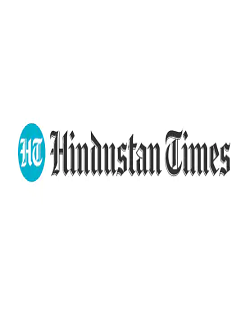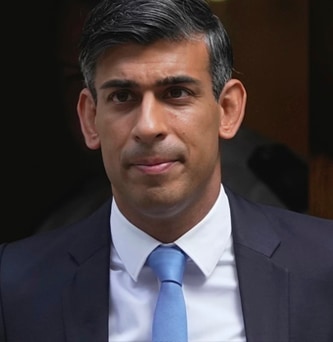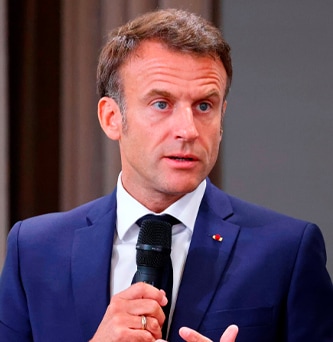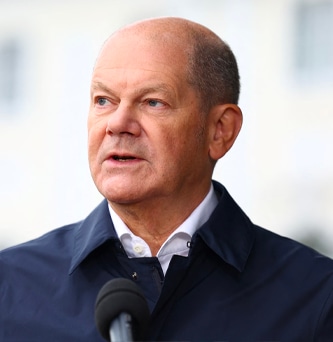G20 LEADERS IN INDIA
G20 Summit in India: All The Global Leaders In Attendance
Prime Minister Narendra Modi will hold more than 15 bilateral meetings with world leaders on the sidelines of the Summit. The G20 comprises 19 countries-- Argentina, Australia, Brazil, Canada, China, France, Germany, India, Indonesia, Italy, Japan, Republic of Korea, Mexico, Russia, Saudi Arabia, South Africa, Turkey, United Kingdom, the United States-- and the European Union.
During the summit, New Delhi will play host to US President Joe Biden, Britain's Prime Minister Rishi Sunak, and Canadian Prime Minister Justin Trudeau, among others. The authorities have beautified roads, footpaths, roundabouts, markets, flyovers, and public areas with over 1 lakh potted plants. ...read more
-
 Joe BidenPresident, USA
Joe BidenPresident, USA -
 Rishi SunakPrime Minister, UK
Rishi SunakPrime Minister, UK -
 Emmanuel MacronPresident, France
Emmanuel MacronPresident, France -
 Justin TrudeauPrime Minister, Canada
Justin TrudeauPrime Minister, Canada -
 Li QiangPremier, China
Li QiangPremier, China -
 Anthony AlbanesePrime Minister, Australia
Anthony AlbanesePrime Minister, Australia -
 Olaf ScholzChancellor, Germany
Olaf ScholzChancellor, Germany -
 Fumio KishidaPrime Minister, Japan
Fumio KishidaPrime Minister, Japan -
 Mohammed bin SalmanCrown Prince, Saudi Arabia
Mohammed bin SalmanCrown Prince, Saudi Arabia -
 Sheikh HasinaPrime Minister, Bangladesh
Sheikh HasinaPrime Minister, Bangladesh -
 Recep Tayyip ErdoğanPresident, Turkey
Recep Tayyip ErdoğanPresident, Turkey -
 Cyril RamaphosaPresident, South Africa
Cyril RamaphosaPresident, South Africa -
 Alberto Ángel FernándezPresident, Argentina
Alberto Ángel FernándezPresident, Argentina -
 Bola Ahmed Adekunle TinubuPresident, Nigeria
Bola Ahmed Adekunle TinubuPresident, Nigeria -
 Yoon Suk-yeolPresident, South Korea
Yoon Suk-yeolPresident, South Korea
Joseph Robinette Biden, Jr. or Joe Biden is the current and 46th president of the United States of America. He was inaugurated as the president on January 20, 2021 after defeating then incumbent president Donald Trump. He served as the vice president under Barack Obama from 2009 to 2017. Biden represented Delaware in the US Senate from 1973 to 2009. Born in Scranton, Pennsylvania on November 20, 1942, Biden graduated from the University of Delaware and Syracuse Law School and served on the New Castle County Council. At the age of 29, he became the youngest person to be elected to the US Senate. He served as the chairman or ranking member of the Senate Judiciary Committee for 16 years, and is known for his work writing and spearheading the Violence Against Women Act — the landmark legislation that strengthens penalties for violence against women, creates unprecedented resources for survivors of assault, and changes the national dialogue on domestic and sexual assault.Biden also served as the chairman or ranking member of the Senate Foreign Relations Committee for 12 years. He played a pivotal role in shaping U.S. foreign policy. He was at the forefront of issues and legislation related to terrorism, weapons of mass destruction, post-Cold War Europe, the Middle East, Southwest Asia, and ending apartheid.
Rishi Sunak is the first British prime minister of Hindu origin. Born on May 12, 1980 in Southampton, Sunak went to Winchester College. He studied politics, philosophy and economics at Oxford University. He was also a Fulbright Scholar at Stanford University (USA) where he studied for his MBA. Before starting his political career, Rishi Sunak had a professional stint in business and finance. He co-founded an investment banking firm working with companies in multiple regions. He was elected Conservative MP for Richmond (Yorks) in May 2015 and served as a Parliamentary Private Secretary at the Department for Business, Energy and Industrial Strategy from June 2017 until his ministerial appointment.Sunak was chief secretary to the Treasury from July 24, 2019 to February 13, 2020, and parliamentary under secretary of state at the Ministry of Housing, Communities and Local Government from January 9, 2018 to July 24, 2019. He was previously appointed Chancellor of the Exchequer from February 13, 2020 to July 5, 2022. Rishi Sunak took oath as the UK prime minister on October 25 last year. He is married to Akshata Murthy, the daughter of Infosys co-founder Narayana Murthy.
Emmanuel Macron is the eighth and current president of France. Born in 1977 in Amienes, he studied philosophy, and later attended the Ecole Nationale d’Administration (ENA) where he graduated in 2004. He joined the Inspectorate General of Finance where he worked for four years before entering the banking sector. In 2012, Macron became Deputy General Secretary of the Presidency of the Republic. He left office in July 2014 and served as the Minister for Economy, Industry and Digital Affairs from August 2014 to August 2016. He began working for then president Francois Hollande when the latter campaigned for the Socialist Party’s nomination for president ahead of the 2012 election.
After Hollande became president, Macron joined him as deputy chief of staff and economic adviser. Macron launched the movement « En Marche ! », founded on 6 April 2016, and was its leader until his victory in the presidential election on 7 May 2017. On 24 April 2022, he was re-elected President of the Republic, becoming the first in two decades to win a second straight term.
Macron earned his second successive victory after he secured an easy win over far-right leader Marine Le Pen. He took 58.55 per cent of Sunday's vote over his contender's 41.5 per cent votes.
Justin Trudeau is Canada's current and 23rd prime minister. Born on December 25, 1971, Trudeau was raised speaking both English and French. He studied literature at McGill University and with a Bachelor of Arts (B.A.) in 1994. Trudeau completed the University of British Columbia’s education programme, and spent several years teaching French, math, and other subjects in Vancouver. He served as the Chair of Katimavik, on the board of the Canadian Avalanche Foundation, and as an advocate for young people and the environment. In his early days in politics, Trudeau in 2007 built a community-based, grassroots campaign to win the Liberal Party nomination in the Montréal riding of Papineau. He was elected in 2008, and re-elected in 2011, 2015, 2019, and 2021.
Trudeau was elected Leader of the Liberal Party in April 2013. His leadership campaign focused on building a new, truly national movement of progressive Canadians, bringing hundreds of thousands of Canadians into politics, most for the first time. On October 19, 2015, Trudeau led his party to victory, winning a majority government with seats in every province and territory across the country. He was sworn in on November 4, 2015. On October 21, 2019, he led the Liberal Party to re-election, earning a second mandate from Canadians. On September 20, 2021, Justin once again led the party to re-election, earning a third mandate to govern.
Li Qiang is the current premier of China. Born in Wenzhou in 1959, he started his career in the civil affairs department. He entered the Zhejiang Agricultural University in 1978, the year that campuses were reopened in China and competition for places was fierce. Qiang was awarded master's degrees from the central party school in Beijing and Hong Kong Polytechnic University. Qiang was appointed the Communist Party boss of Wenzhou in 2002 at the age of 43. He established himself as a keen supporter of the city's private sector. Qiang joined Zhejiang’s provincial party committee in 2003, less than a year after Xi Jinping took control of it, and was promoted to secretary general in 2004.
Qiang was Xi Jinping's secretary until the latter left for Shanghai in 2007. Qiang was appointed as Zhejiang governor at the end of 2012 after Jinping took over as Communist Party general secretary.In June 2016, Qiang was named CPC secretary of Jiangsu province, but just 15 months later was appointed as the party secretary of Shanghai, where he oversaw increased foreign investment in the city, including the construction of Tesla's gigafactory. Qiang's reputation took a hit last year when he was blamed for a two-month Covid-19 lockdown that hurt the city's economy. He became the premier in March this year.
Anthony Albanese is serving as the prime minister Australia since May 2022. Born in 1963 in Sydney's inner west, Albanese was the first person in his family to finish school. He graduated from the University of Sydney with a Bachelor of Economics.
In 1996, Albanese was elected as the federal member for Grayndler. Two years later, he introduced a bill to grant same-sex couples the same superannuation benefits as heterosexual couples. After the bill failed, Albanese reintroduced it thrice before being eventually passed in 2007. That year, Labor Party won the federal election and Albanese took oath as the first federal infrastructure minister. He was appointed the deputy prime minister 2013 in the Kevin Rudd-led Labour government. In 2019, he was unanimously elected as the new Leader of the Australian Labor Party. Three years later, he led the party to victory and became the prime minister.
Born on June 14, 1958 in Osnabruck, Scholz is the current Chancellor of Germany. He studied law at between 1978 and 1984. He has been a member of the Social Democratic Party of Germany since 1975. He worked as a civil servant from 1984 to 1985, before opting for a career as a lawyer. In 1998, Scholz was elected to the Bundestag and remained a member till 2001. He served as the Interior Senator of the Free and Hanseatic City of Hamburg from May-October 2001. In 2002, he was again elected to the Bundestag and remained a member till 2011.
From 2005 to 2007, Scolz served as the First Parliamentary Secretary of the SPD parliamentary group in the Bundestag. He also served as the federal minister of labour and social welfare and later finance. In February 2018, he became the acting chair of the SPD and rose to become the deputy chair of the SPD. In December 2021, he was appointed chancellor.
Fumio Kishida is the current prime minister of Japan. Born on July 29, 1957, Kishida graduated from School of Law at Waseda University. He joined the Long-Term Credit Bank of Japan Ltd in 1982. Within five years, he became a secretary to a member of the House of Representatives. He was elected to the House of Representatives for the first time in 1993. He served as parliamentary vice minister for construction in 1999 and 2000. In 2005, he was appointed as chairperson of Committee on Health, Labour and Welfare at the House of Representatives.
Kishida served as minister for consumer affairs and space policy in 2008, minister for foreign affairs from 2012 to 2016. In August 2017, he was appointed as the political chairperson of his Liberal Democratic Party.
Mohammed bin Salman, commonly known as MBS, is the Crown Prince of Saudi Arabia and among the most influential figures in the broader Middle East region. A member of the Saudi royal family, Mohammed bin Salman was born on August 31, 1985, in the House of Saud. His father, King Salman bin Abdulaziz Al Saud, ascended to the throne in 2015, which subsequently elevated Mohammed bin Salman's position in the kingdom. In June 2017, Mohammed bin Salman was appointed Crown Prince of Saudi Arabia by his father, King Salman, following the removal of the previous Crown Prince, Muhammad bin Nayef. This move consolidated his power and made him the de facto ruler of the country. One of MBS's most significant initiatives was the launch of "Vision 2030," a plan aimed at diversifying Saudi Arabia's economy away from its heavy dependence on oil. It includes various economic and social reforms, such as privatization of state-owned enterprises, promotion of tourism, and enhancing the role of women in the workforce. MBS also initiated several social reforms, including allowing women to drive, easing restrictions on entertainment and cultural activities, and promoting a more moderate form of Islam. However, Mohammed bin Salman's leadership has been marked by controversy, including criticism of Saudi Arabia's human rights record, its handling of dissidents, and the murder of journalist Jamal Khashoggi in 2018, which Saudi Arabia acknowledged but denied direct involvement.
Sheikh Hasina has served as the prime minister of Bangladesh since January 2009. Sheikh Hasina is the daughter of Sheikh Mujibur Rahman, the founding father of Bangladesh who led the country to independence from Pakistan in 1971. She is associated with the Bangladesh Awami League, one of the country's major political parties. Sheikh Hasina first served as the Prime Minister of Bangladesh from 1996 to 2001. She returned to office for her second term as Prime Minister in 2009, following the December 2008 general elections and won two consecutive general elections since then. Under Sheikh Hasina's leadership, Bangladesh has experienced significant economic growth and development, with a focus on infrastructure, education, and healthcare. She has maintained friendly relations with neighbouring countries and has been active in regional and international diplomacy. Her tenure, however, has been marked by political polarization and allegations of human rights abuses, including concerns about press freedom and the treatment of political opponents.
Turkish President Recep Tayyip Erdoğan has played a significant role in Turkiye's politics for several decades. Born in 1954 in the Kasımpaşa neighbourhood of Istanbul, Recep Tayyip Erdoğan grew up in a working-class family and attended religious schools during his early education. He graduated from Marmara University in Istanbul with a degree in Economics and Commercial Sciences. Erdoğan's political career began when he became involved in Islamist political movements during the 1970s. He was part of various political groups and organizations with Islamic leanings. He served as the Mayor of Istanbul from 1994 to 1998, during which time he initiated various infrastructure projects and gained recognition for his leadership in the city. In 2001, Recep Tayyip Erdoğan co-founded the Justice and Development Party (AKP), a centre-right political party with Islamic conservative roots. The AKP won the parliamentary elections in 2002, and Erdoğan became the Prime Minister of Turkey. During his time as Prime Minister (2003-2014), Turkey experienced significant economic growth and political stability. Erdoğan served as the 12th President of Turkey from 2014 onwards after winning the presidential election. As President, he sought to expand the powers of the presidency through a controversial constitutional referendum in 2017, which transitioned Turkey from a parliamentary system to a presidential one. Recep Tayyip Erdoğan is married to Emine Erdoğan, and they have four children together.
South African President Cyril Ramaphosa assumed the office in February 2018. Born in Soweto, a township in Johannesburg, South Africa, Matamela Cyril Ramaphosa grew up during the era of apartheid, a system of racial segregation and discrimination. Despite the challenges of apartheid, he managed to pursue higher education and studied law at the University of South Africa (UNISA) and completed his degree through correspondence courses while working. Ramaphosa played a crucial role in the anti-apartheid struggle and labour movement in South Africa. He became involved in student politics during his university years and joined the South African Students' Organization (SASO). Ramaphosa was instrumental in the negotiation process that led to the end of apartheid, including the talks between the government and the African National Congress (ANC). He was a close associate of Nelson Mandela and played a vital role in the peaceful transition to democracy in 1994. He was considered a potential successor to Nelson Mandela as President but lost the race to Thabo Mbeki in 1997. Ramaphosa left active politics for a period and became a successful businessman. He re-entered politics in the early 2010s and was elected as Deputy President of the ANC in 2012 and subsequently became Deputy President of South Africa under President Jacob Zuma in 2014. Ramaphosa was elected as the President of the ANC in December 2017 and was sworn in as the President of South Africa in February 2018 after Jacob Zuma resigned. Cyril Ramaphosa is married to Tshepo Motsepe, a medical doctor and the First Lady of South Africa. He has children from his previous marriage.
Alberto Ángel Fernández is an Argentine lawyer and politician who has served as the President of Argentina since December 10, 2019. Alberto Ángel Fernández was born in Buenos Aires on April 2, 1959. He studied law at the University of Buenos Aires (UBA) and later completed a postgraduate degree in Latin American Integration at UBA. Fernández began his political career in the Peronist movement and served in various positions in the Argentine government. He worked as an advisor to the Argentine Chamber of Deputies and as the Chief of Staff to the Minister of Social Development during the presidency of Carlos Menem. In 2003, during the presidency of Néstor Kirchner, Fernández was appointed Secretary of Legal and Technical Affairs, a position he held until 2008. He has had a successful legal career, including working as a professor of criminal law at the University of Buenos Aires. He has also published several books on law and politics.
Alberto Fernández was elected President of Argentina in the 2019 presidential election. His election marked the return of the Peronist party to the presidency after a period of non-Peronist governments. He assumed office on December 10, 2019, succeeding President Mauricio Macri. Alberto Fernández has been married twice and has two children.
Bola Ahmed Adekunle Tinubu, often referred to as "Bola Tinubu", is the 16th president of Nigeria. Born in Lagos, Tinubu attended St. John's Primary School, Lagos, and Children's Home School in Ibadan. He later studied at the Richard Daley College in Chicago, Illinois, USA, where he obtained a Bachelor of Science degree in Accounting. Tinubu worked for several American companies, including Arthur Andersen, Deloitte, Haskins, & Sells, and GTE Services Corporation. He gained experience in financial management and accounting during his time in the United States. Bola Tinubu's political career took off in the 1990s when he became involved in the pro-democracy movement during Nigeria's transition to democracy. He joined the National Democratic Coalition (NADECO), a group that agitated for the return of democracy to Nigeria during the military era. Tinubu played a crucial role in the electoral victory of the Alliance for Democracy (AD) in Lagos State during the 1999 elections, which marked the beginning of his political prominence. He served as the Governor of Lagos State from May 29, 1999, to May 29, 2007.
Bola Tinubu is known for his role in the formation of the All Progressives Congress (APC), a major political party in Nigeria. The APC was formed in 2013 as a merger of several opposition parties to challenge the dominance of the People's Democratic Party (PDP). Tinubu has been credited with contributing to the democratic transition in Nigeria but has also faced allegations of corruption and nepotism. Bola Tinubu is married to Oluremi Tinubu, a Senator in the Nigerian National Assembly. He is often referred to by his political allies and supporters as "Asiwaju" (meaning "Leader" in Yoruba). Tinubu's political style is characterized by strategic alliances and coalition-building.
Yoon Suk-yeol is a South Korean politician who became the President of South Korea in 2022. Born in 1969 in Seoul, Yoon Suk-yeol attended Kyungbock High School and later graduated from Seoul National University, where he studied law. Yoon earned a master's degree in international law from the Graduate School of International Studies at Seoul National University. Yoon Suk-yeol started his career as a prosecutor and worked in various positions within the South Korean legal system and gained recognition for his work. Yoon was known for his role in prosecuting high-profile cases, which helped build his reputation as a capable and diligent prosecutor. Yoon Suk-yeol transitioned from a career in the judiciary to politics when he became affiliated with the conservative People Power Party (formerly known as the Liberty Korea Party) and quickly rose through the ranks of the party. Yoon Suk-yeol announced his candidacy for the 2022 South Korean presidential election, representing the People Power Party. His victory marked a shift in South Korean politics as the conservative party returned to power after a period of progressive leadership under President Moon Jae-in.




















